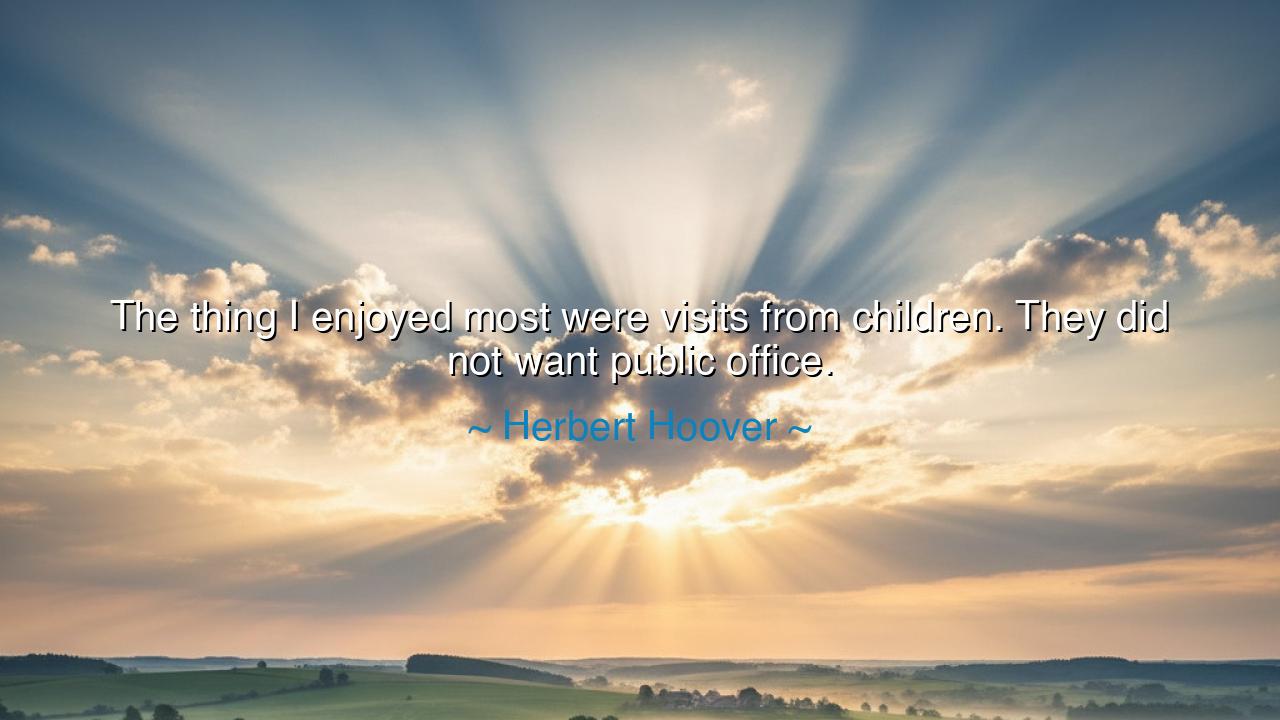
The thing I enjoyed most were visits from children. They did not






The words of Herbert Hoover, spoken after the storms of his presidency, carry the fragrance of humility and quiet truth: “The thing I enjoyed most were visits from children. They did not want public office.” This saying, wrapped in both sorrow and tenderness, unveils the burdens of power. For in the hearts of children, Hoover found something rare—innocence untouched by ambition, joy unclouded by the hunger for authority. To a man worn by the weight of public office, such moments were not small—they were a refuge, a reminder of life’s purer treasures.
The ancients knew well that children were the image of simplicity, the bearers of truth untainted. While rulers plotted and senators schemed, the laughter of youth remained free of intrigue. Hoover, who bore the crushing burden of the Great Depression, saw in children a world unstained by politics, a realm of honesty where no one sought advantage or power. In their eyes was the very opposite of the endless bargaining and bitterness of public life.
Consider the tale of Abraham Lincoln, who, amid the blood and sorrow of the Civil War, often welcomed children into the White House. It was said that the President found solace in their presence, allowing them to climb upon him and ease, for a moment, the agony of a nation divided. Like Hoover, Lincoln knew that in the voices of children, unburdened by ambition, there dwelled a light that could pierce even the darkest gloom of leadership. Their innocence offered what politics never could—rest for a weary heart.
Hoover’s words, though clothed in humor, reveal a deeper wisdom: that the pursuit of public office is often a path of sorrow, heavy with disappointment, hostility, and ceaseless struggle. To delight in the company of those who do not seek such power is to glimpse something divine—a freedom from envy, a purity that the world of politics has long forgotten. In this way, children become silent teachers, reminding leaders of what is truly worth cherishing.
Let the generations learn from this truth: power fades, honor grows hollow, and even the highest office cannot soothe the soul. But the laughter of children, who desire not crowns nor titles, holds a wisdom greater than ambition. To the one who listens, as Hoover did, they whisper that joy is not found in ruling others, but in cherishing the simple, the pure, and the uncorrupted gifts of life.






KTKien Trung
This quote makes me reflect on how children view the world compared to adults. They seem to have a more genuine, unbiased way of seeing things, while adults, especially politicians, often have agendas. Could Hoover’s appreciation for children’s visits be his way of critiquing the cynical nature of political life? Should we take lessons from the purity of children’s perspectives to better navigate the challenges of leadership?
MNMen Nguyen
Perhaps Hoover's reflection on children highlights a broader dissatisfaction with the political landscape. If children, with no interest in power, could offer a fresh perspective, then what does that say about the state of adult politics? Is the pursuit of power inherently corrupting, or is it simply a reflection of the societal pressures we place on our leaders?
TDDang Huynh The Dat
Hoover’s statement about enjoying visits from children without political motives reveals a contrast between the simplicity of childhood and the often complicated nature of politics. It raises the question: what would politics look like if it were driven by the sincerity and selflessness of children, rather than the ambition often seen in public offices? How can we bring more honesty and purity into the political system?
HTManh Hieu Truong
This quote makes me wonder: why did Hoover feel a stronger connection with children than adults in political circles? Could it be that, in politics, ambition often overshadows genuine service? Are children’s more innocent, untainted motivations a reminder to adults in politics about what really matters? How can we foster more of that childlike purity in modern political leadership?
N1News 1Sao
It’s interesting that Hoover found joy in visits from children who didn’t seek political gain. Does this mean he longed for a time when public service was more about duty and less about personal power? Could it be that his disillusionment with politics led him to value the purity of children’s intentions over the complex motivations of politicians?